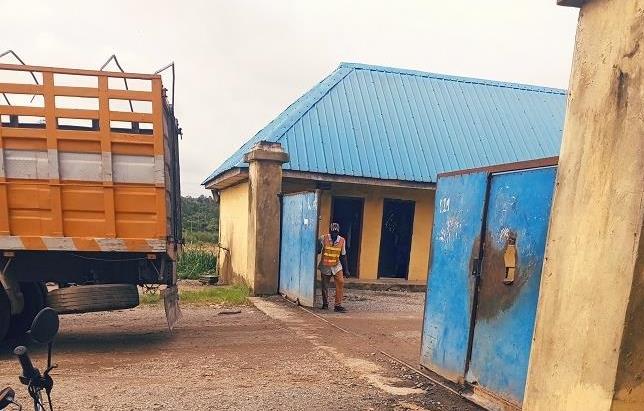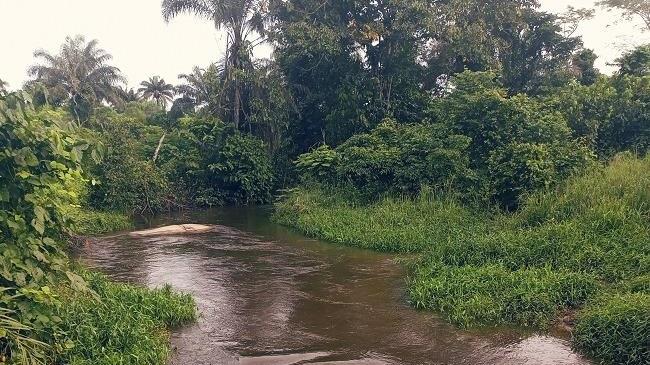The impact of toxic waste disposal in a river area is detrimental to indigenous peoples who live, use and benefit from the environment.

On September 3, 2020, the Chinese company, WeWood, engaged in ethanol production, discharged toxic waste into a pit that killed three people in the Omotosho Forest Reserve, Okitipupa council, Ondo State, Nigeria. The deceased Monday Akinmusire, 35; Samuel Louis, 45; and Adebowale Ododolewa, 19, had gone to the forest to cut down trees and sell them, but were flooded by an excavated toxic waste pit surrounded by a sandpile used by WeWood for waste disposal.
Taiwo Ashogbo, a cassava and yam farmer from Akinfosile, said that before WeWood came, he was growing crops in the forest reserve on 3 acres of land. Now there is not enough land to grow these crops. The only place to grow crops is 7 kilometers from Akinfosile, but the land is small.
Nensin Oyebi, a farmer, was cultivating yam, plantain and cassava in 5 acres of land.
A yam, manioc and plantain farmer, Nensin Oyebi, was growing 5 acres of land before WeWood arrived. There’s not a lot of space left for him. “As a matter of fact, the company prevented us from drinking water from the Ufara River because of its toxic waste. The smell of toxic waste is a great challenge for our health,” said Nensin.
However, the Olufara of Akinfosile, Olamide Ayodele, said WeWood occupied the people’s farmland, and it is hard for them to grow crops.
Consequences of pollution
According to Olamide, a year ago, young people went to the forest reserve and about that time, the waste from WeWood broke out of the pit and killed them all. The reserve is a river area, but the company usually pours toxic waste into it. Although WeWood has compensated the deceased families, their spouses are widowed while the children are fatherless.

“They dig wells and dump toxic waste that overflows during the rainy season and pollutes our environment,” said Ogunbami Ayodeji, a farmer.
The facts show that the boys were killed by toxic waste. This is a huge challenge to the Ondo State government on environmental monitoring and control. After all, the government leased the forest to the Chinese company to clear and replant trees.
However, Mr. Wole, WeWood’s community and public relations officer, admitted that on September 2, 2020, the company’s waste spill surged the limitations when rain has fallen and polluted rivers and the ecosystem. However, after this period, WeWood redesigned its waste treatment plant that processes toxic waste.
Mr. O. Akinga, Ecological Officer, Ondo State Ministry of Environment, said the state now has a stable relationship with WeWood, even if gaps and expectations need to be addressed. WeWood has had serious problems in the disposal of toxic waste spilling into nearby waters. As a result, the government inspected the company’s facilities and learned that it had acquired a new waste treatment plant that we hope will reduce pollution in the region.
Nigeria is reported to produce the largest amount of hazardous waste in Africa, about 1,440,000 tonnes annually. Pollution contributes to the preventable mortality of about 9 million people annually, mostly in developing countries. According to the World Health Organisation, about 7 million people died from indoor and outdoor air pollution-related illnesses in 2012.
“Two years ago, I wrote a letter to WeWood about their toxic waste being dumped in the Ufara River. All the fish of the river are dead, and the water is polluted, and our people cannot use it for drinking or other domestic uses. The nearly 6,000 people in Akinfosile are unable to use the polluted Ufara River because it causes skin rashes,” said Olamide.
However, Dr. Oluwaseun E. Odipe, lecturer at the Department of Environmental and Occupational Health, School of Public Health, University of Medical Sciences, Ondo State, said the physical, chemical and biological properties of the waste would influence the quality of the water making it toxic for aquatic animals, biological organisms that depend on the water for survival, limiting their growth, altering the natural processes in many ways, distorting the aesthetic view of the water body, polluting groundwater and surrounding aquifer in the environment, and even possibly causing certain diseases and ailments for the users.
But Sunday Okeke, a farmer and fisherman, wants WeWood out of the region. The air is terrible, and his children often cough. When there was no meat, he caught fish in the Ufara River, but now, because of pollution, there is nothing underwater. Akinfosile has no clinic, so it makes life difficult for his family.
Livelihoods are at stake
Taiwo wants WeWood not to destroy the whole forest, but to leave part of it to agriculture because it is the source of revenue for the people.
A few of Akinfosile’s youth work at WeWood. But it has polluted farmland. “We haven’t received anything from the company since it arrived. Government and WeWood should help with basic amenities,” said Mr. Ogunbami.
However, Mr. Wole affirmed, it’s the company’s responsibility to ensure Akinfosile prosper in health and economic activities. Hence, the company has strengthened relations with the community over the past year, delivering 70 units of chairs at the high school in Omotosho and opened up opportunities for local cassava farmers.
No drinkable water
“The company began drilling a borehole, but the project was interrupted. When I asked Mr. Wole, he said all projects funded by the firm are contracts. At the time I wanted to write a letter to WeWood, the chief of Omotosho, but turned it down,” Olamide said.
Nensin admitted that the community is unsatisfied with the situation and is asking for support for a clean water source.
Pollution is another significant source of water scarcity in Nigeria. Waste is frequently dumped into rivers and streams. Poor water quality has consequences for people, the economy, and the environment. Water contamination is the main cause of diseases such as typhoid fever, diarrhea, and dysentery in Nigeria. It is killing people and it is costing the economy. Just 19 percent of the Nigerian population has access to safe drinking water. Even though 67 percent of the population has a basic water supply, access is uneven. 82 percent of the population in the cities has a basic reserve. However, in rural areas, only 54 percent have access.
However, Mr. Wole says: “He will ensure that the borehole is constructed, although the company is facing financial difficulties.”
Now, talking of Akinfosile and extent of pollution, an industrial treatment process can only be sponsored by the government or the company that caused it (Polluters Pay Principle) which should be implemented as soon as possible because natural remediation would take a very long time. However, practices such as use of coagulants, filtration, sedimentation, boiling, solar disinfection and other low-cost options can be in place at individual households before water usage or consumption.
By Francis Annagu
This story was produced in collaboration with the Africa-China Reporting Project at Wits Journalism
